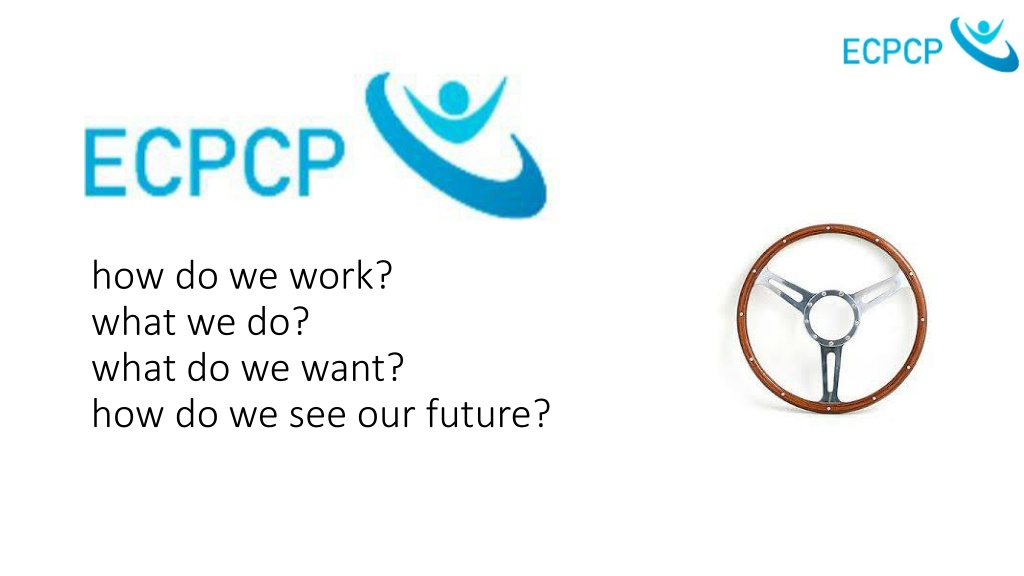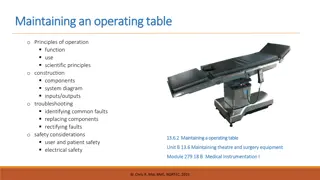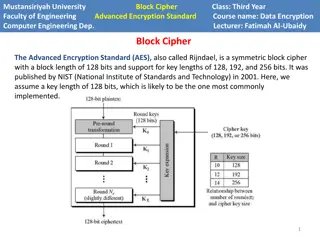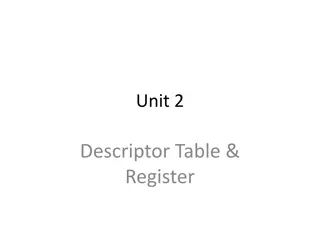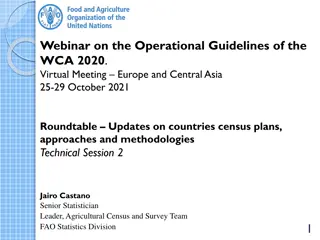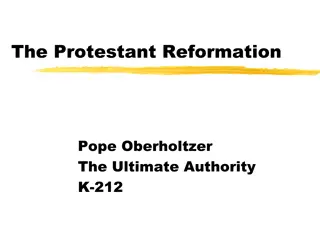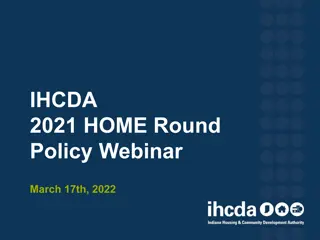Exploring ECPCP: Who We Are, How We Work, and Our Future Vision
Discover the European Confederation of Primary Care Paediatricians (ECPCP), its history, leadership, growth, and meetings. Learn about the challenges faced in certain countries and the unique position of ECPCP as an independent association with strong relationships to other healthcare organizations.
Download Presentation

Please find below an Image/Link to download the presentation.
The content on the website is provided AS IS for your information and personal use only. It may not be sold, licensed, or shared on other websites without obtaining consent from the author. Download presentation by click this link. If you encounter any issues during the download, it is possible that the publisher has removed the file from their server.
E N D
Presentation Transcript
who we are? how do we work? what we do? what do we want? how do we see our future?
GP in UK PCP in Europe The solution Mixed health systems
Short history of ECPCP Executive Bureau President Dr. Gottfried Huss Vice President Dr. Angel Carrasco Sanz General Secretary Dr. Luis S nchez Santos Treasurer Dr. Daniela Kasparek President of Honor Dr. Elke Jaeger-Roman Assistant to General Secretary Dr. Marie- N elle Robberecht 25 years ago until 2009 we had the Society of Ambulatory Paediatrics ESAP with individual members of Spain, Hungary, Italy, Switzerland etc a precursor of ECPCP with the objective to coordinate research In Berlin 2009 14 national organisations founded ECPCP - since that time ECPCP has been growing steadily in spite of all adversities Former presidents: Elke Jager- Roman (Germany), Luis Sanchez (Spain) Executice Committee has 21 members from all 21 associations Every association has a certain number of delegates to the General Assembly Working groups: Research, Curriculum, Strategy and Advocacy , Science, Vaccination COSI
2015: 21 associations in 18 countries representing more than 25000 Primary Care- / Community- Paediatricians
ECPCP meetings venues November 2009 Berlin EC, Foundation of ECPCP March 2010 Budapest EC, GA October 2010 Copenhagen EC, GA May 2011 Vilnius EC, GA October 2011 Budapest EC June 2012 Strasbourg EC, GA November 2012 Budapest EC July 2013 Tel Aviv EC, GA, Practice visits premiere October 2013 Santiago de C. EC, Practice visits March 2014 November 2014 Budapest Berlin EC EC, GA, Practice visits April 2015 Rome EC, Practice visits
Why are some countries grey on the maps ? You dont find paediatricians in the community of those countries- they work in hospitals They have few paediatricians working in the community but do not have an association for representation and/ or not decided to join ECPCP GPs or family doctors have the steering wheel in primary care sometimes in a deficient NHS Is this a disadvantage? This is an issue. In some countries it is in others not
We are unique We are independent We can stand alone now We have good relationships to other associations (EAP, EPA, IPA)
Strategic Paediatric Alliance A joint statement From European Academy of Paediatrics (EAP) European Confederation of Primary Care Paediatricians (ECPCP) European Paediatric Association (EPA) A shared vision for improving community and primary care services for children, adolescents and their families in Europe Draft statement for consideration by signatories by 15thMarch 2015 Version 9
Some questions to the primary care / community Some questions to the primary care / community paediatricians from Simon paediatricians from Simon Lenton Council member to Gottfried Huss ECPCP Council member to Gottfried Huss ECPCP Lenton UK NHS / EPA UK NHS / EPA How do primary care paediatricians envisage community-based healthcare provision for children and families for the next generation? What will be the contribution of primary care / community paediatricians? PCPs work as guides, advocates and networkers for the family and the child in complex health. PCPs should have the steering wheel in the drivers seat of the primary care team.
Some questions (2) Some questions (2) What age group of children and young people will primary care paediatricians provide health services for? From birth to the 18th birthday in many countries, some disabled chronically ill for a longer period. Will primary care paediatricians provide 24/7/365 urgent and emergency care? PCPs care for 24/7/365 in 95% of cases and areas (variation from country to country), supplemented by GPs for older children and some very emergent cases , during the workday access to the PCP is much easier, home visits children become a rare event. How is the reality in the countries? Area for research!
Some questions (3) Some questions (3) Do primary care paediatricians have a role in providing care to children in hospital settings? In Germany 80% of areas offer emergency outpatient care in evenings and weekends. PCP go into the in hospitals for that service. They hand over to residents in the nights. Will primary care paediatricians provide comprehensive care for children with long-term conditions? (Comprehensive care includes educational, social, psychological and family aspects of care) PCPs provide comprehensive care for children with acute and long-term conditions, some are cared for by social paediatric centres.
Some questions (4) Some questions (4) Which groups of conditions would be considered outside the competence of a primary care paediatrician? Inside: They care for asthma, neurodevelopmental and speech delay, family problems, networking with social service and therapists Outside: epilepsy, neuro-paediatrics, ADHD, endocrinology, youth community services, school medicine, paediatric GYOB Will primary care paediatricians be the first point of contact for children and families with all concerns and where there are concerns about mental health? PCP are the first contact for all undifferentiated concerns. There is an unmet need for more social workers and psychological help in the community to take the evident overload from PCP and its team.
Some questions (5) Some questions (5) Which groups of conditions would be considered outside the competence of a primary care paediatrician? Inside: They care for asthma, neurodevelopmental and speech delay, family problems, networking with social service and therapists Outside: epilepsy, neuro-paediatrics, ADHD, endocrinology, youth community services, school medicine, paediatric GYOB Will primary care paediatricians be the first point of contact for children and families with all concerns and where there are concerns about mental health? PCP are the first contact for all undifferentiated concerns. There is an unmet need for more social workers and psychological help in the community to take the evident overload from PCP and its team.
Some questions (6) Some questions (6) Will primary care paediatricians provide public health advice and expertise on a population basis? No they do not they are not trained to do so but they provide health education. Should primary care paediatricians be responsible for population- based immunisation programmes? They are! There is nobody else in Germany and in many other countries doing vaccinations. Problems arise from lacking coverage. We have again measles outbreaks. I am convinced that this is not only doctors business it can be performed by nurses combined with public registry see the Nordic and developing countries.
Some questions (7) Some questions (7) Should primary care paediatricians be responsible for population- based screening programmes? Metabolic screening and oto- acustic emissions are performed in hospitals, PCP control that his has been done, developmental screening and further vision and hearing screening and hip screening are done by PCP. I see no reason to change, but the screenings need more standardisation Is there a role for primary care paediatricians in antenatal and newborn care? Antenatal care not very much, sometimes advice, new-born care certainly after hospital delivery, the first well baby visit is 3- 10 days of age (breastfeeding, bonding, jaundice, hip screening)
Some questions (8) Some questions (8) What is the role for primary care paediatricians in the management of child abuse and safeguarding children? Observation, early detection, transferal, coordination of services. This is always an area for discussion and improvement. How will care be provided in rural locations where there are not enough children to support a full paediatric "team". In 10% of rural areas services are provided by GPs. Our ambition is to provide 100% coverage depends on our workforce.
Some questions (8) Some questions (8) Should primary care paediatricians be doing joint clinics with specialist paediatricians? Yes, they work together with a paed. pulmonologist, paed. cardiologists and paed. Rheumatologists( diversity in countries). I could not respond to every question with exact information from every ECPCP countries. Some data refer to Germany only. It would be desirable to have this data from other countries available. This is an area for future ECPCP health systems research.
What we want some of our objectives (1) What we want some of our objectives (1) That all aspects of United Nations children s rights convention are implemented - especially children s rights to healthcare independent of race and origin, the right for protection from abuse and neglect, the right to receive health promotion and prevention of avoidable diseases through immunization. That other aspects of child rights originating from the United Nations convention such as the right for privacy, informed consent and adequate pain avoidance and reduction are respected in hospitals and ambulatory care.
What we want some of our objectives (2) What we want some of our objectives (2) That all European states ratify the United Nations children s rights convention and have an independent children s rights representative in the parliament. That the paediatricians who work in the community and in primary care in many European countries will be maintained and will not be replaced by providers with less specific training. That the accepted and proven components of child services in Europe will be preserved because simple replacement of primary care paediatricians can result in a decrease of service quality and less satisfaction among families.
What we want some of our objectives (3) What we want some of our objectives (3) That those paediatricians who are trained and experienced for their work in the community will hold the reins as coordinators for health care of children and adolescents and will not be replaced by general practitioners. Governments should recognize the proven benefits of trained providers in ambulatory paediatrics and should give priority to the children and adolescents. Governments should care for the preservation and the further development a competent workforce for child care services.
What we want some of our objectives (4) What we want some of our objectives (4) Everybody who cares for children must have adequate period of training, a sound knowledge of the subject-matter and be proficient. Community based care is best delivered by a competent team of providers where the paediatrician should have a coordinating role with public health, social care and education. Children and adolescents should receive services with the best obtainable quality and not merely average, affordable services, because they are our future!
we work hard every day there is evidence from comparative studies that we perform better than other providers childrens rights are a priority for us we dont want to be replaced we will have the steering- wheel in the primary care team
